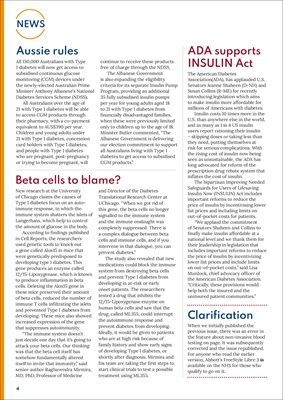
4
NEWS
Aussie rules
All 130,000 Australians with Type
1 diabetes will now get access to
subsidised continuous glucose
monitoring (CGM) devices under
the newly-elected Australian Prime
Minister Anthony Albanese's National
Diabetes Services Scheme (NDSS).
All Australians over the age of
21 with Type 1 diabetes will be able
to access CGM products through
their pharmacy, with a co-payment
equivalent to AUS$390 per year.
Children and young adults under 21
with Type 1 diabetes, concession card
holders with Type 1 diabetes, and
people with Type 1 diabetes who are
pregnant, post-pregnancy or trying
to become pregnant, will continue to
receive these products free of charge
through the NDSS,
The Albanese Government
is also expanding the eligibility
criteria for its separate Insulin Pump
Program, providing an additional
35 fully subsidised insulin pumps
per year for young adults aged 18
to 21 with Type 1 diabetes from
financially disadvantaged families,
when these were previously limited
only to children up to the age of 18.
Minister Butler commented, "The
Albanese Government is delivering
our election commitment to support
all Australians living with Type 1
diabetes to get access to subsidised
CGM products."
ADA supports
INSULIN Act
The American Diabetes
Association(ADA), has applauded
U.S. Senators Jeanne Shaheen (DNH) and Susan
Collins (R-ME) for
recently introducing legislation
which aims to make insulin
more affordable for millions of
Americans with diabetes.
Insulin costs 10 times more
in the U.S. than anywhere else in
the world, and as many as 1 in 4
US insulin users report rationing
their insulin - skipping doses or
taking less than they need, putting
themselves at risk for serious
complications. With the rising
cost of insulin now being seen
as unsustainable, the ADA has
long advocated for reform of the
prescription drug rebate system
that inflates the cost of insulin.
The bipartisan Improving
Needed Safeguards for Users of
Lifesaving Insulin Now (INSULIN)
Act includes important reforms
to reduce the price of insulin by
incentivising lower list prices and
including limits on out-of-pocket
costs for patients.
"We applaud the commitment
of Senators Shaheen and Collins to
finally make insulin affordable at a
national level and we thank them
for their leadership in legislation
that includes important reforms
to reduce the price of insulin by
incentivizing lower list prices and
include limits on out-of-pocket
costs," said Lisa Murdock, chief
advocacy officer of the American
Diabetes Association. "Critically,
these provisions would help both
the insured and the uninsured
patient communities."
Beta cells to blame?
New research at the University
of Chicago claims the causes of
Type 1 diabetes focus on an autoimmune response,
in which the
immune system shatters the islets of
Langerhans, which help to control
the amount of glucose in the body.
According to findings published
in Cell Reports, the researchers
used genetic tools to knock out
a gene called Alox15 in mice that
were genetically predisposed to
developing type 1 diabetes. This
gene produces an enzyme called
12/15-Lipoxygenase, which is known
to produce inflammation in beta
cells. Deleting the Alox15 gene in
these mice preserved their amount
of beta cells, reduced the number of
immune T cells infiltrating the islets
and prevented Type 1 diabetes from
developing. These mice also showed
increased expression of the gene that
suppresses autoimmunity.
"The immune system doesn't
just decide one day that it's going to
attack your beta cells. Our thinking
was that the beta cell itself has
somehow fundamentally altered
itself to invite that immunity," said
senior author Raghavendra Mirmira,
MD, PhD, Professor of Medicine and
Director of the Diabetes Translational
Research Center at UChicago. "When
we got rid of this gene, the beta cells
no longer signalled to the immune
system and the immune onslaught
was completely suppressed. There
is a complex dialogue between beta
cells and immune cells, and if you
intervene in that dialogue, you can
prevent diabetes."
The study also revealed that
new medications could block the
immune system from destroying beta
cells and prevent Type 1 diabetes
from developing in at-risk or early
onset patients. The researchers
tested a drug that inhibits the
12/15-Lipoxygenase enzyme on
human beta cells and saw that the
drug, called ML355, could interrupt
the autoimmune response and
prevent diabetes from developing.
Ideally, it would be given to patients
who are at high risk because of
family history and show early signs
of developing Type 1 diabetes, or
shortly after diagnosis. Mirmira and
his team are taking the first steps to
start clinical trials to test a possible
treatment using ML355.